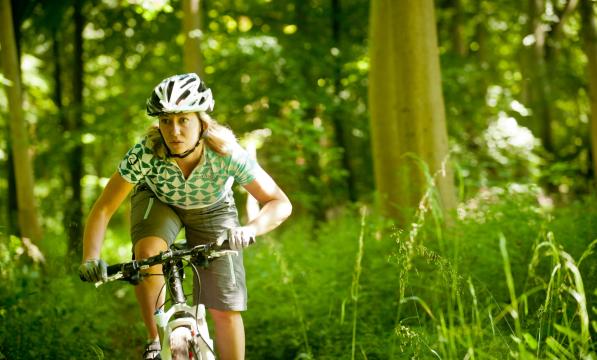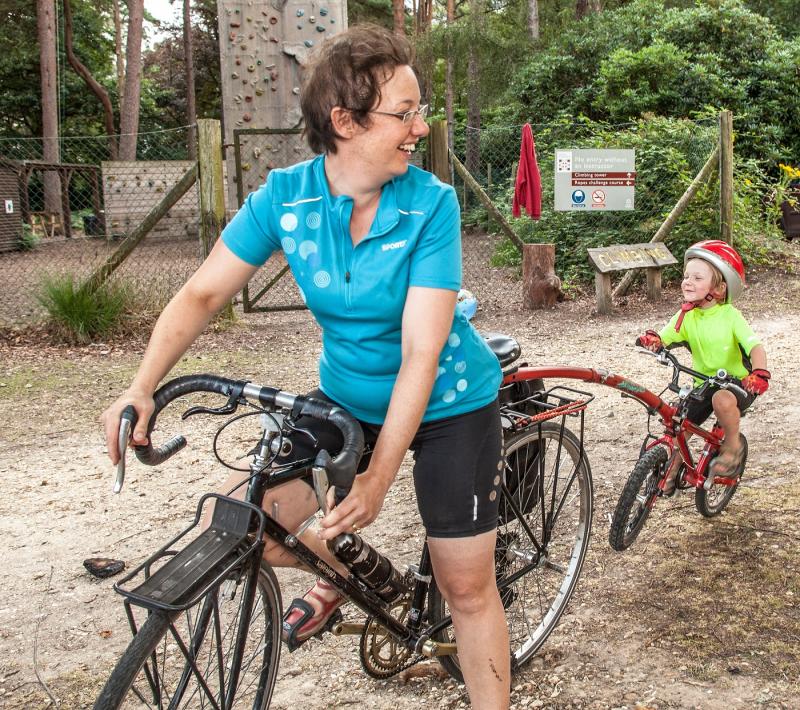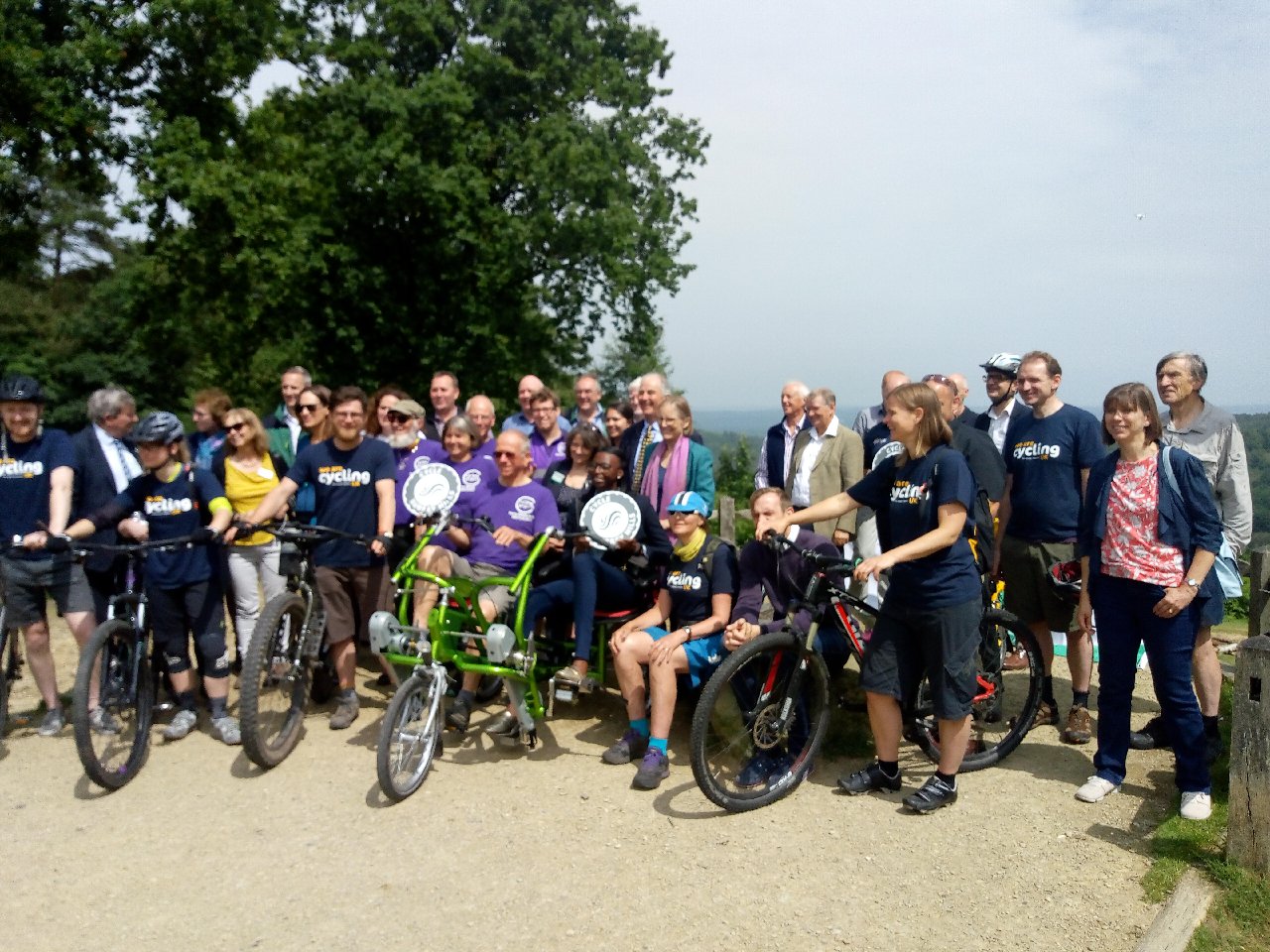Why improving off-road access for cyclists in England and Wales is a feminist issue

Both men and women in the UK are currently facing an obesity epidemic but far fewer women than men take enough exercise to meet guidelines for participation in at least moderate intensity physical activity (66 per cent of men as opposed to 56 per cent of women). Cycling is an excellent way of taking part in such physical activity and it not only improves physical health, but also mental health and well-being. Young women in particular are at risk of poor mental health, with recent reports suggesting that one in five of them are suffering from anxiety and depression. Other studies have shown that having access to the countryside and connecting with nature can vastly ameliorate these feelings.
I enjoy both commuting and road riding but my preference is definitely for riding off-road. By leaving the road network and the urban environment behind, I immediately feel more relaxed and able to appreciate the scenery, breathe in the fresh air and encountering the odd owl, badger or deer, helps lift my spirits still further. I've certainly no need for 'mindfulness' training during or after a good ride.
A natural high
In addition, the endorphins you experience from making your heart and lungs work hard gives you a natural high that no pill can match. Off-road riding provides excellent anaerobic and aerobic exercise and the adrenalin kick I get out of riding fast down a swooping bit of single track is far preferable to that from negotiating my way past a queue of traffic!
Women still tend to be the primary care givers in families, despite recent trends towards men taking on the role. This can bring with it an unwritten assumption that men who work full-time outside the home are somehow more 'entitled' to relaxation time, particularly if they also enjoy cycling, which can make it all the harder for women to fit exercise into their routines. But they are probably the ones that need the escape the great outdoors provides the most.
When my children were younger, I started riding off-road on a Sunday morning so I could be back by lunch-time, having covered in three hours the off-road equivalent of a 50-60 mile road ride, which would have taken me the best part of a day. Once I had purchased some decent night ride lights, my husband and I alternated going out on a Thursday evening too, with me often performing nit-combing duties minutes before racing out of the house to the start point of the ride. Heading into the woods in the dark is a thrilling experience, something I find much more to my liking than PTA meetings or book clubs!
But you don't need to be sporty or looking for an adrenalin buzz to get a lot out of off-road cycling. Riding is one of the few physical activities families can enjoy doing together. Many would not countenance riding on the road with their children but, away from the roar of traffic, they can relax and indulge in some conversation while taking part in a healthy pursuit.

However, the haphazard English and Welsh rights of way network includes many routes that would be very suitable for cycling on by families - and other groups such as novices, people with disabilities and the elderly - but many are currently inaccessible. These include many footpaths that connect to the wider bridleway and byway network, meaning that a continuous or circular route is impossible. 74% of respondents to Cycling UK's recent survey on off-road access reported that current network is not suitable for modern cycle usage. (87% of all respondents to the survey were male, which is in itself is probably quite telling.)
In some areas, parts of West Sussex for example, there are almost no bridleways or byways at all. More off-road routes could also enable more women to make utility journeys by bike, as well as for leisure and exercise purposes. I am lucky enough to have the choice of several route options when commuting and, being a trained cyclist, I don't have the same fear of traffic as many but my favourite journey is definitely along the canal towpath, almost completely away from the urban din.
Rocking the baggy look
Off-road cycling is also more attractive than road riding for many women because they prefer the look of baggier clothing, as opposed to the fitted look of tight Lycra. There is a wide range of stylish female cycle clothing to choose from these days, from the 'gnarlier' looks of companies such as Flare, who produce garments suitable for technical riding, to new companies like Findra, who produce clothes as suitable for cycling as for sitting in a cafe.
Body image is yet another issue that can put women off cycling, having 'cool' tough yet feminine role models such as Rachel Atherton and Manon Carpenter show that it's possible to both look and feel amazing while engaging in a sport, although they may not think of it as such. Women of all shapes and sizes can and do enjoy the activity but for many, the idea of joining the 'lycra louts' would be anathema.The fact that mountain biking men tend to wear baggier clothing too is a bonus, in my opinion! The MAMIL (Middle-Aged Man in Lycra) stereotype is as rare a beast as the red squirrel, once you hit the trails these days.
Young women in particular face many challenges from the all-pervasive tendrils of social media nowadays. They are expected to be photogenic, sexy and demure but also independent, tough and even 'badass' (dictionary definition: cool and confident). Mountain biking as a sport can deliver the latter in spades: who doesn't love the chance to get muddy and sweaty, and not worry about looking neat and tidy for a change? The fact that the kit such riders use reinforces this look is all part of its attraction for some: knee and elbow pads, full-face helmets and so on.
Pushing the boundaries
Which brings me on to another way in which women can benefit exponentially from off-road riding. Once you leave tracks like fire-roads behind, it can become more challenging. For many women, fear of crashing means they would never want to tackle such terrain but many others do. And the increase in confidence from achieving something you didn't think you could do makes it all the more rewarding.
Even after riding off-road for 25 years, I still experience a sense of pride when I successfully tackle a section of more technical terrain that I wasn't sure I could master."
Julie Rand, Cycling UK Member Group Coordinator
Even after riding off-road for twenty-five years, I still experience a sense of pride when I successfully tackle a section of more technical terrain that I wasn't sure I could master (or should that be mistress?!). The challenge can also include the ascent of a particular climb or mountain top but currently many of these are only accessible on foot due to there not being any bridleway route up.

Fun, freedom, fresh air, forests - and feminism. A winning combination.
Low confidence and self-esteem are a notorious female mind-set in all areas of life, with women often being under-estimated (and underestimating themselves) as to what they can accomplish. In my experience, and I accept it's possibly a sweeping generalisation, women tend to enjoy the scenery and the social side of riding more than the technical aspect of bikes themselves: men talk endlessly about sprockets and forks, women about their day at work or the countryside around them. On a recent Hopetech women's ride, I don't think I heard any of the 20 or so women mention the bike they were riding once. For many of us, it really ISN'T about the bike!
There are other reasons why cycling off-road rather than road riding may be preferable to many women. For one thing, MTB groups tend to be less competitive than many of the sportier road riding ones. By its very nature, mountain biking means you are often stopping to catch your breath, to admire the scenery, to have a drink or to find the right route, so there's generally time for slower or less confident riders to catch up. Discomfort in the saddle is also an issue for many women so frequent stops and the ability to move position on the bike can help alleviate this, plus you can wear as many layers below as you wish, without attracting funny looks! Also, finding somewhere to pee in the woods is a lot easier than when you're on a road ride and wearing bib shorts...
Having your cake - and eating it too!
Talking of which, last but certainly by no means least on the list of benefits to women (and men, too, of course, although they tend to be less weight and body conscious than women) is that off-road riding is excellent calorie-burning activity: about 528 calories per hour mountain biking on terrain of moderate difficulty, apparently. There aren't many sports or leisure activities which positively encourage you to have your cake and eat it too, or your beer and crisps if you prefer. I'm not knocking Pilates, yoga or any other physical activity popular with women, but for keeping weight off and fitness high, you can't beat a good off-road ride that ends in a pub or cafe, as long as you don't overdo the calories of course. Riding a bike is also a non-weight bearing activity so good for those who find it painful or difficult to do things like jogging or playing tennis due to osteoporosis or other issues with their joints. With the advent of electric bikes, the hills will be alive with the sound of ageing mountain bikers for years to come...
But with much of the current network in England and Wales restricted to cyclists, reaching the natural world by bike in many areas is more difficult than it could be, which is why Cycling UK is aiming to lobby for improved access to the countryside for cyclists, whether male or female, but for the reasons stated above, women have most to gain from such a move.
Until we have proper Space for Cycling throughout the UK, the rights of way network provides a vast resource of quiet routes that could be used to enable more women (and many men and children, too) to cycle when they might not otherwise do so.


